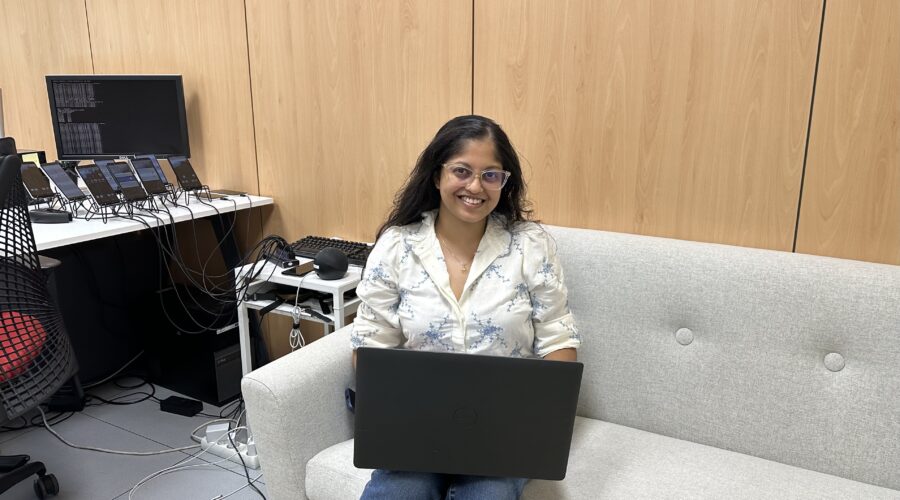IMDEA Networks

Vinuri Bandara recibe la Google PhD Fellowship por su investigación en seguridad y privacidad en Android
Su trabajo busca comprender y mitigar los riesgos ocultos en el ecosistema Android, y esta beca le permitirá ampliar su infraestructura de análisis y generar un impacto real, haciendo que la tecnología sea más confiable
24 Octubre 2025

Vinuri Bandara, estudiante de doctorado en IMDEA Networks, es una apasionada de la tecnología. Su compromiso con hacerla más transparente y confiable guía su trayectoria y constituye el eje central de su investigación. Tiene claro que una de sus metas a largo plazo es lograr que el ecosistema de Android sea más seguro. Y ya está dando sus primeros pasos para conseguirlo: acaba de recibir una Google PhD Fellowship, uno de los reconocimientos más importantes para jóvenes investigadoras en el ámbito de las ciencias computacionales.
Describe tu proyecto de investigación de doctorado.
Mi investigación de doctorado analiza cómo los fabricantes de dispositivos Android y otros socios de la cadena de suministro modifican el sistema operativo de formas que, de manera no intencionada, pueden debilitar la seguridad y la privacidad.
Aunque la apertura de Android fomenta la innovación, también genera una profunda fragmentación y cambios ocultos que afectan a miles de millones de usuarios.
Estoy desarrollando herramientas a gran escala para detectar y comprender estas modificaciones no documentadas, con el fin de evaluar su impacto en la confianza de los usuarios y las expectativas de los desarrolladores.
A largo plazo, mi objetivo es hacer que el ecosistema de Android sea más transparente, más seguro y que las marcas que lo utilizan rindan cuentas.
¿Cuál crees que es el aspecto más innovador o destacado de tu investigación?
Lo que diferencia mi trabajo es que no se limita a identificar qué hace único a un dispositivo Android a nivel de código, sino que también busca entender la intención detrás de esos cambios.
Combinando análisis diferencial a gran escala con razonamiento semántico basado en modelos de lenguaje, puedo explicar por qué los fabricantes realizan determinadas modificaciones, ya sea por cumplimiento normativo, telemetría o rendimiento.
Esto permite pasar de simples hallazgos técnicos a explicaciones significativas que pueden orientar una mejor gobernanza de la plataforma y políticas de seguridad más efectivas.
La Google PhD Fellowship es un reconocimiento muy prestigioso. ¿Qué significa para ti?
Ser seleccionada para la Google PhD Fellowship en Privacidad, Seguridad y Protección significa mucho para mí. Es un reconocimiento de que el trabajo que he estado realizando realmente importa.
Resulta alentador saber que las personas que dan forma a la tecnología cada día ven valor en esta investigación. Para mí, es a la vez una validación y una motivación: un recordatorio de seguir avanzando y una oportunidad para transformar mi investigación en algo que genere un impacto real más allá del ámbito académico.
¿Cómo te ayudará el apoyo financiero y la mentoría de Google Research a avanzar en tu investigación y carrera?
El apoyo de la beca me permitirá ampliar mi infraestructura de análisis y cubrir actividades clave como la asistencia a conferencias y futuras estancias de investigación, esenciales para profundizar en colaboraciones y ampliar el alcance de mi trabajo.
Bajo la guía continua del profesor Narseo Vallina-Rodríguez, mi supervisor en IMDEA Networks, aspiro a obtener resultados de investigación significativos con la perspectiva adicional de una mentora o un mentor de Google Research.
Gracias a sus aportaciones, espero que mi trabajo no solo contribuya al conocimiento académico, sino que también fortalezca el ecosistema Android y mejore la seguridad de los usuarios en la práctica.
¿Qué te motivó originalmente a realizar un doctorado en tu campo?
Siempre me han fascinado las capas invisibles que mantienen unidos los ecosistemas tecnológicos y la cantidad de confianza que depositamos en ellos sin darnos cuenta, ya sea en los desarrolladores, los dispositivos o las empresas tecnológicas.
Durante mis estudios anteriores, observé cómo muchos de estos sistemas eran cerrados y cuánta poca visibilidad tenían los usuarios sobre lo que realmente ocurría.
Esa curiosidad y el deseo de aportar más transparencia y equidad a la tecnología fue lo que me llevó a investigar sobre seguridad y privacidad.
Hacer un doctorado me pareció el camino adecuado para profundizar y contribuir de forma duradera a ese objetivo.
¿Dónde te ves dentro de 5–10 años y cómo influirá la beca en esa trayectoria?
Dentro de cinco o diez años, espero estar en un punto en el que mi trabajo haya mejorado de forma tangible la manera en que las personas experimentan la privacidad y la seguridad en su vida diaria.
Quiero que lo que construyo y estudio tenga un verdadero impacto y contribuya a que la tecnología sea un poco más confiable y transparente.
También me gustaría ser profesora en algún momento, para ayudar a estudiantes a descubrir la misma emoción y propósito en la investigación que yo he encontrado.
La Google PhD Fellowship me ofrece el espacio y la confianza necesarios para crecer hacia ese futuro. Contar con este apoyo y mentoría me permite centrarme en un trabajo que genere un impacto real y, con suerte, algún día ayudar a otros a hacer lo mismo.
¿Qué consejo darías a otros estudiantes de posgrado que aspiran a obtener becas como esta?
Elige un problema que realmente te importe, algo que mantenga viva tu curiosidad incluso en los días difíciles, no solo uno que sea fácil de medir.
Concéntrate en hacer bien tu trabajo antes de preocuparte por el reconocimiento: el impacto llegará de forma natural.
Comparte lo que construyas, mantente abierta o abierto a los comentarios y rodéate de personas que te inspiren a pensar en grande.
Oportunidades como esta beca surgen cuando tu trabajo transmite una historia clara de propósito y curiosidad genuina.


Comentarios recientes